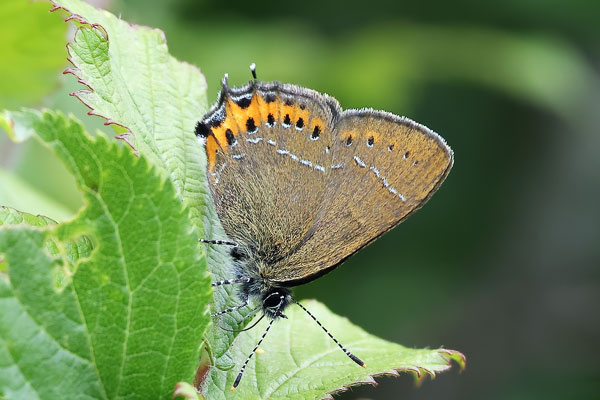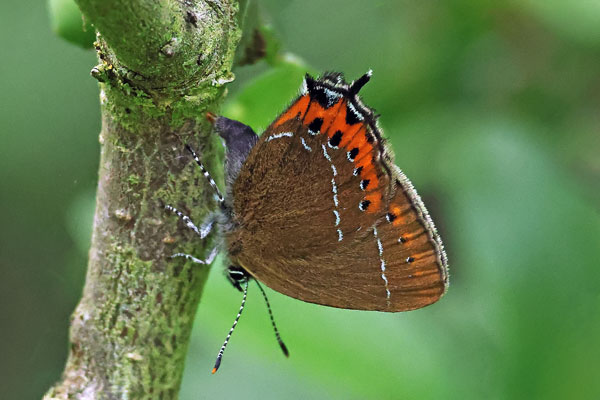Black Hairstreak (Satyrium pruni) | Species | ||||||||||||||||||||||||||||||||||||||||||||||||||||||||||||||||||||||||||||||||||||||||||||||||||||||||||||||||||||||||||||||||||||||||||||||||||||||||||||||||||||||||||||||||||||||||||||||||
 Male. Taken at Otmoor, Oxon., on June 2nd 2025. (© David Hastings) (1/320th sec at f/11)  Female. Taken at Bernwood Meadows, Bucks, on June 2nd 2025. (© David Hastings) (1/640th sec at f/10) DescriptionFamily: Theclinae Wing span: 34 - 40 mm The Black Hairstreak is very similar to the White-letter Hairstreak. The main distinguishing feature between the two species is that the Black has a row of distinctive black dots running along the inside of the orange band on the underside of the hindwing; these are absent in the White-letter. Male and female Black Hairstreaks are similar, but the hindwing tails are longer in females. This species has a very restricted distribution in England, which follows a line of clay soils between Peterborough and Oxford. It is widespread but patchily distributed in Europe. Black Hairstreak colonies are typically located in small woods or nearby hedgerows, where stands of mature Blackthorn grow. Sites are located in sheltered, sunny positions and typically have a southerly aspect to them. The flight period only lasts for about 3 weeks in June. The ovum is the over-wintering stage, with the young caterpillar fully formed inside. The primary larval foodplant is Blackthorn. Wild Plum is also used occasionally. As well as aphid honeydew, adults will also take nectar from flowers such as Wild Privet, Dog Rose and Bramble. Adults spend much of their time resting high up on Field Maple, Ash or Blackthorn, crawling over leaves and twigs in search of aphid honeydew. Males make short, looping flights in and out of the canopy; females are more sedentary. They always rest with their wings closed. Endangered Earliest UK sighting: 31st May ; Latest UK sighting: 8th July Sightings
| |||||||||||||||||||||||||||||||||||||||||||||||||||||||||||||||||||||||||||||||||||||||||||||||||||||||||||||||||||||||||||||||||||||||||||||||||||||||||||||||||||||||||||||||||||||||||||||||||

